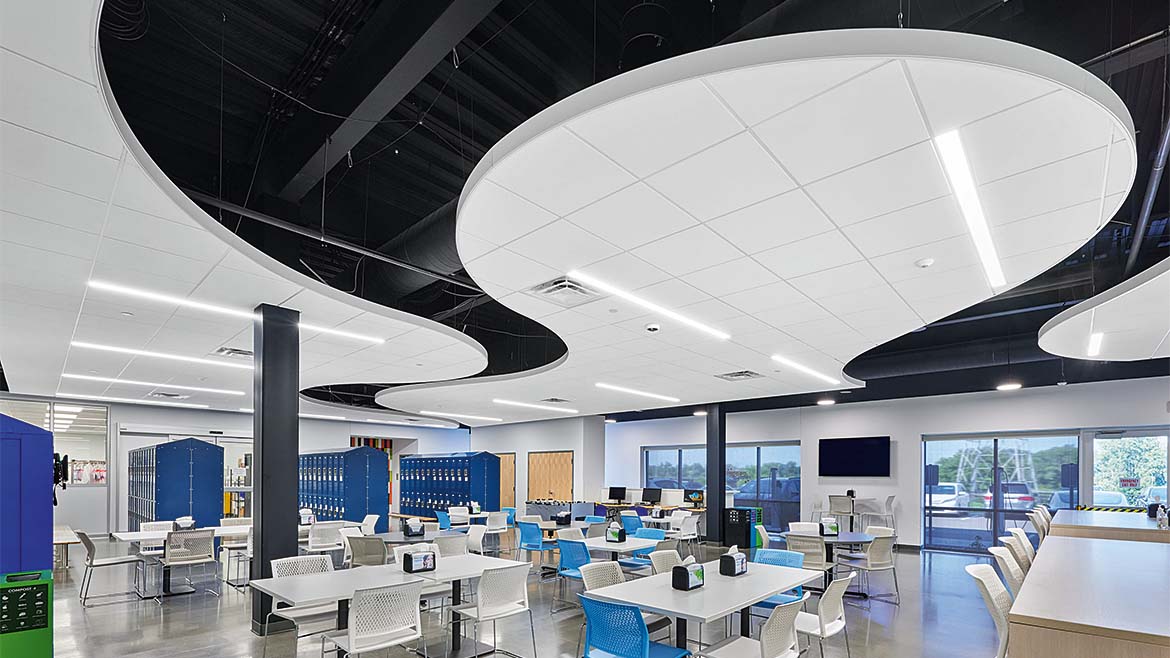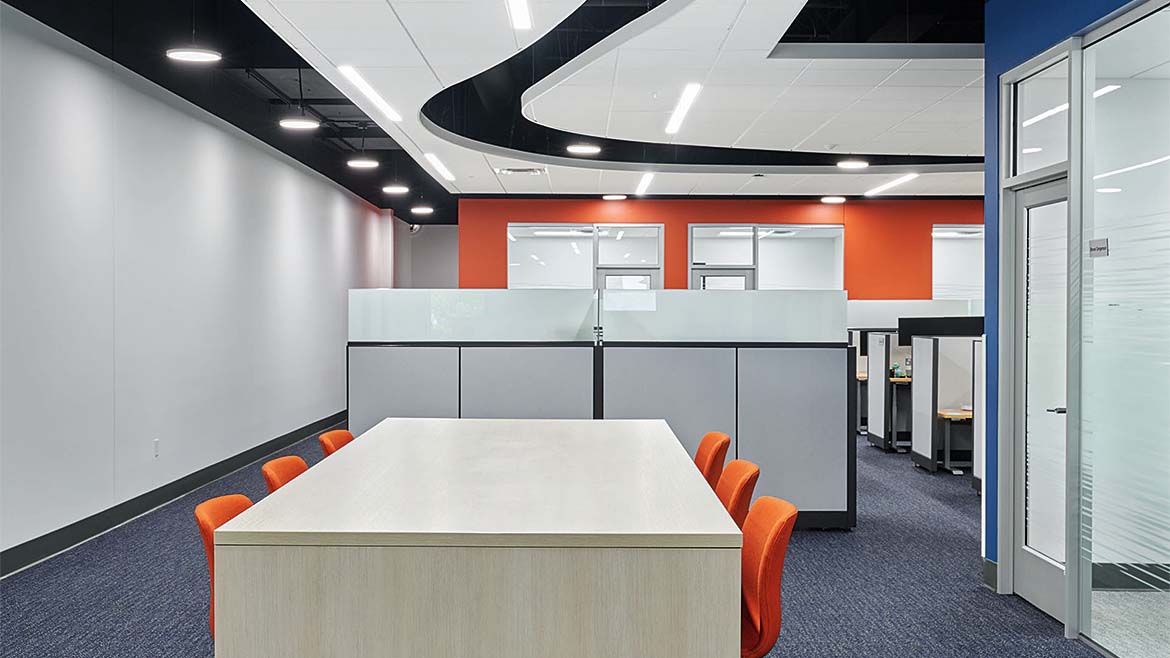Colder Products Company’s new global headquarters in Arden Hills, Minn., needed the ceiling design to be more than just a centerpiece to convey its forward-thinking culture to staff, clients, and visitors. The company charged Hagen, Christensen, & McIlwain Architects of Minneapolis with developing a ceiling that inspired movement and established connectivity across every space—from offices to breakrooms—on not one, but two stories. The Mississippi River drove the vision as a symbol of the state, a point of pride for the local community, and a means to create flow through the entire building.
The challenge came in capturing the natural, unsymmetrical ebbs, flows and bends of the river while containing it in a space that ultimately had to be confined by straight-line borders where ceilings met the wall. Moreover, creating the fluidity of the design intent required minimal splicing and visible lines—a challenge amplified by the large surface area to be covered in the project. Lastly, the CPC ceiling design and installation occurred at a time when built environment projects prioritized sustainability, resource efficiency and solutions for workforce shortages.

A fully collaborative effort of the architect, contractor, and ProjectWorks team significantly reduced installation while completely meeting the design intent.
Design and Pre-Construction Service Simplifies Hundreds of Moving Parts
The CPC project was a natural fit for the ProjectWorks Design and Pre-Construction Service, and the architects and contractor were eager to collaborate with its team. To accomplish the river design intent, 4,000 linear feet of curved and straight perimeter trim were used. The project also utilized lay-in and tegular ceiling panels installed in a 9/16-inch exposed tee suspension system. The complementary service became essential in simplifying the complexity of hundreds of “moving parts” and ensuring efficient, accurate installation without waste in time or materials.
In-house Design Software Plus the Human Touch Make it Work
Architectural drawings were given to a CAD Specialist, Sean Fordyce, who used the ProjectWorks in-house design software to adjust the trim layout to seamlessly align with manufacturing and curving capabilities.
“It was an exciting challenge, requiring me to examine and adjust each curved segment throughout the project before it could be optimized,” says Fordyce, who puts the CPC project in his top five in terms of difficulty. “There were a lot of curve and radii variations, so I used some techniques to minimize splines. I was able to come up with a drawing that captured the design intent and that was only a few of inches off the original.”
Once the architect approved the revisions, ProjectWorks optimized the trim by repositioning splice locations throughout the space to utilize maximum lengths of standard-sized material. This helped minimize material waste and unsightly splice locations, ensuring clean transitions between curved and straight perimeter trim.

ProjectWorks optimized the Axiom by repositioning splice locations throughout the space to utilize maximum lengths of standard-sized material, helping minimize material waste.
Saving Waste, Time and Costs
As part of the design and pre-construction service, a drawing package was provided that included a detailed breakdown of the location of every trim segment, which was individually labeled. This package was paired with an optimized manufacturing trim schedule, detailing the most efficient cut order to yield the least amount of scrap. The trim was precut and pre-bent to drawing specifications and arrived in an organized arrangement that simplified installation for the contractor.
Due to complex areas, a few field modifications—which were communicated to the installing contractor—were required.
“Out of 4,000 square feet of Axiom trim—equating to more than 400 pieces—only two had to be trimmed slightly for the install, which I was able to easily identify thanks to the life-size template provided,” said Josh Finch, project foreman, Architectural Sales of Minnesota, who installed the ceiling. “This was amazing. The organization was incredibly impressive. In 20 years of installing ceilings, this was probably my second most difficult. What was achieved with simple tagging and organization of wrapped materials made a huge difference.”
Materials were provided in a highly organized manner, packed in crates designated for a given space, and drawings were clearly numbered and lettered. These assets plus the delivery of prefabricated Axiom trim saved significant time and cost as well as reduced material waste.

Impeccable design was achieved by eliminating unsightly splice locations and ensuring clean transitions between curved and straight perimeter trim.
Spot on with the Design Intent
Project architects Matthew Lysne and Nick Lager says it was a fully collaborative effort and put great value in the way the ProjectWorks team understood their vision and upheld the design aesthetic.
“Working with the ProjectWorks team was a great experience and they completely met our design intent,” says Lager. “They understood and delivered on our vision of taking a rigid office environment and creating natural movement that flowed throughout the entire two floors.”
To get a snapshot of how all the pieces of the CPC ceilings project came together with the help of digital and pre-construction services, view this video.







